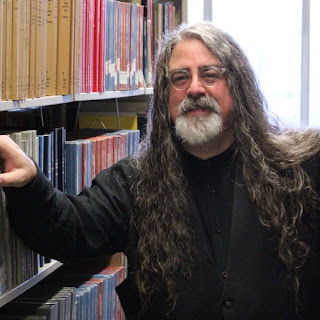The art song refracted through our (and earlier) times: Frank Felice's 'The Beauty of Innuendos'
This new CD (Navona Records) is a vocal showcase for a mezzo-soprano whose work as a
 |
| Frank Felice connects with variety of texts. |
soloist and teacher is well-known around Indianapolis. Mitzi Westra is closely acquainted both personally and professionally with the composer, Frank Felice of Butler University.
Assisting the singer, with remarkable insight and taste, is pianist Gregory Martin of the University of Indianapolis faculty. "The Beauty of Innuendos," helpfully subtitled "Four Song Cycles," takes its title from a line in the composition that comes across best to me, "Thirteen Ways of Looking at a Blackbird." This well-known poem by Wallace Stevens uses short, formally varied, and somewhat cryptic stanzas for its oblique perspectives on the creature. Felice seems to respond freshly to each of the thirteen "ways."
 |
| Mitzi Westra sings 'The Beauty of Innuendos' |
The poet's barest image can generate complementary music, usually underlined by the piano. Separate, "frozen" chords accompany the line that starts "VI": "Icicles filled the long window / With barbaric glass." The "indecipherable cause" traced by the shadow of the blackbird rounds out the image perfectly.
Felice's melodic gift blossoms through the gracefulness of Westra's phrasing. Her lower range is particularly expressive: the final stanza haunts my memory: "It was evening all afternoon. / It was snowing / And it was going to snow. / The blackbird sat / In the cedar limbs." The piano coda following Westra's interpretation of those words has the eloquence of Schubert, but properly a little more terse.
"Letters to Derrick" reveals a shift in Felice's music, as his adeptness indicates that a composer needs to set prose different from poetry. It partly has to do with the elevation of Stevens' language contrasted with the colloquial prose in letters by a young friend of baritone Derrick Pennix, who commissioned the cycle.
The friend has the open ebullience of adolescence, and her frank, friendly style in the letters draws from Felice a distinct mastery of vernacular language, coming close (in a paean to Chicago sports teams, particularly the Bulls) to the pep-song common touch you can find in some songs of Charles Ives. I think a comparison might also be made with the dignified yet informal manner of setting prose by the late Dominick Argento.
"Four Songs of Jennifer Haines" presents emotional entanglements in a style that is more explicit than what Stevens called "the intricate evasions of as." The texts help Felice exercise an approach that irons matters out without oversimplifying. I particularly liked what the duo does with "Cassaundra," an evocation of the sometimes miserable fate that often awaits truth-tellers.
Finally, with the piano helping to communicate the religious ecstasy he shares with a poet-musician over a great expanse of time, comes Felice's "Four Antiphons of Hildegard of Bingen." The piano writing is more florid, and Gregory Martin is again equal to the task of making it just as expressive as other idioms Felice is comfortable with. As Westra turns to Latin texts, the singing is fully matched to the music's demands: her contralto register is especially thrilling, but her command of the music's whole range is of a piece.
I need to add what may sound like the old song that advocates of vinyl annoyingly warble: The digital technique that has triumphed since the CD came in a few decades ago lends a kind of hard clarity to many instruments, including the human voice. Westra's voice sounds considerably warmer when heard in person. Still, this well-recorded recital displays it well. I would simply recommend attending her concert performances whenever possible. Meanwhile, this recording is a worthy document of her artistry, and a fine representation as well of both the composer and the pianist.



Comments
Post a Comment